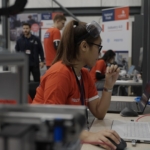We have exciting new research in partnership with the Edge Foundation that demonstrates how skills competitions are making a big difference to the prestige of apprenticeships and technical careers. It’s research that bears out what colleges, training providers and employers consistently tell us: skills competitions provide a form of accelerated development in which young people achieve greater technical excellence in their skill.
We wanted to explore this in a more structured way, so working with our partners at Edge we set out to create a more comprehensive evidence base to help demonstrate the benefits of skills competitions and how we can harness and grow this potential further across England, Scotland, Wales and Northern Ireland in line with public policy goals for skills and careers advice. The research comprised two main parts: a survey of young people who have recently participated in our competitions; and in-depth case studies in which we delve a little deeper into the personal stories of the competitors to reveal how skills competitions have helped to change their lives and careers.
Our findings demonstrate three key themes. Firstly, the value of skills competitions is clear as a successful tool for driving up standards and inspiring young people to excel in their technical education and apprenticeships, developing the skills the economy needs. Secondly, showcasing participation in skills competitions at local, regional and national levels has a positive impact on a young person’s development and career prospects. Thirdly, that this positive impact is derived by participating in the competition at any level and is not necessarily dependent on the level of success achieved.
The numbers from our survey of competitors are powerful. Skills competitions depend on the hundreds of dedicated tutors throughout our FE colleges and training providers who consistently go the extra mile. They are a credit to their profession and the scale of their influence on young people puts this into even sharper focus: 90% of our competitors were encouraged to take part by a tutor, making it by far the most common route into skills competitions. Put simply, without the dedication and inspirational mentoring of tutors, skills competitions would not exist. We owe so much to our tutors.
Another finding that jumped out was the ability of skills competitions to consistently exceed young people’s expectations. We asked our competitors about their expectations from skills competitions in three key respects: developing a stronger CV, demonstrating their existing skills and improving their technical skills. For me, these are core benefits to taking part. In each respect our competitors’ expectations are exceeded. Taking developing a stronger CV: whereas 59% expected taking part to contribute in this respect, fully 91% were satisfied that this had in fact been the case. It’s hard to underplay the significance of this: a young person’s CV is their passport through life, it’s the first port of call when employers are assessing how their attributes match against a job’s requirement. Getting involved in skills competitions demonstrates to employers exactly the kind of transferable skills that they are looking for.
Young people who participate in competitions develop invaluable transferable skills and come out as well-rounded individuals. This is particularly important when you consider that 86% of employers believe that attitude towards work to be of greater importance than general academic ability (43%). The survey findings back this up: participant after participant agreed that skills competitions gave them the transferable skills that employers say they need: working under pressure (90%), time management (86%), resilience (84%), confidence (83%). The full list is available in the report, but you can appreciate the trend.
It’s these traits that I notice when speaking to competitors at all levels of our system: from those who were out in Abu Dhabi at last year’s Skills Olympics right through to our national and regional finalists. The stories of some of these remarkable young people are told in the research.
Alfie Hopkins was part of our 30-strong team in Abu Dhabi, representing us in web design. As with all the young people in our research, his words provide a more powerful testimony to what competitions are all about than I ever could: ‘In my day-to-day job I’m using technologies that I wouldn’t have even touched if I hadn’t done WorldSkills UK. The personal skills I developed from the events included the ability to talk in front of crowds which I would have never done a couple of years ago. A lot of people comment on that and how I’m not just a programmer but I can talk to people as well and share my thoughts’.
As a result of these findings, we will work with our partners to do more to ensure that schools, colleges, training providers, employers and young people are aware of skills competitions and the benefits they bring. We want to increase participation so that more young people can access the range of benefits of participating. Further, we will promote these benefits to employers, parents and policy makers and, in doing so, contribute to enhancing the value and prestige of apprenticeships and technical career routes.
Ultimately, boosting the numbers of highly skilled and ambitious young people filling technical career routes and apprenticeships will benefit the economy and help more young people get a better start in work and life.


